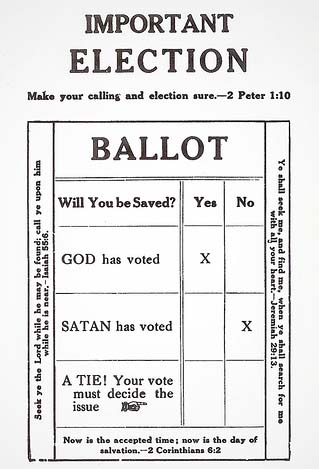This was just intended to be a response to Andrew’s previous post, but as it grew a bit lengthy, I thought to generate a follow-up post regarding Dr. Patterson’s comments about total depravity at the “John 3:16 Conference”. I hope that SBF readers may find something useful for contemplation here as well as in the fine observations Andrew is providing. I know that we both encourage further discussion and civil debate among readers.
Man’s depravity according to Dr. Patterson is not total, and so he should not refer to it as such. If we can hear and appreciate the preaching of the gospel (the “helicopter blades” in the analogy), our intellect is not fallen, and if we desire to be saved from our condition (the sea), then our will is not fallen. So then the fall and thus our depravity are not total. It is of concern to see leaders in the SBC desiring to hold on to some language which appeases Baptists’ sense of man’s misery in sin and the need for God’s grace, but then muddying the issue with an unbiblical elevation of fallen man’s abilities. As Calvin said of early church fathers who erred regarding free will:
To avoid delivering any principle deemed absurd in the common opinion of mankind, they made it their study, therefore, to compromise between the doctrine of the Scripture and the dogmas of the philosophers.
One huge problem with the sailor analogy is that it’s quite obvious to the sailor that he’s in danger and needs saving. However, in the spiritual realm, the natural man has no sense of this. He “loves the darkness”, and spiritual things are “foolishness to him”. It was said that he can just barely hear, and so he can respond. That concept does not appear to be biblical. “He who has ears to hear, let him hear” seems more appropriate. When God opens ears, the message is loud and clear, and is embraced by the hearer; when He doesn’t, he remains completely deaf.
It is awful to use the scripture about Abraham’s age and feebleness, which was in regard to fathering children, as a case for the ability to believe despite spiritual deadness. I appeal to any who use this reference as such to please stop such an embarrassing misuse of scripture. Further discussion could be provided, but really should not be necessary in this case. It’s an absurd argument.
Dr. Patterson apparently claimed that we are not guilty except through our own transgression. What then does it mean that we are “by nature children of wrath”? Why did David say “I was shapen in iniquity, and in sin did my mother conceive me”?
Our guilt was imputed to us before we did anything. One of the best ways to see this truth is to examine the “as” and “just as” comparisons in Romans 5. Of course, merely a reading of 5:18 shows us “Therefore, as one trespass led to condemnation for all men, so one act of righteousness leads to justification and life for all men.” Does condemnation not imply guilt?
But beyond that, back to the direct comparison the scripture is drawing: In Christ, the second Adam, are we righteous by our actual deeds? No. Was the righteousness passed down to us via our lineage? No. Christ’s righteousness is imputed to us – we are declared righteous – even though still sinners, as Luther observed. So likewise, Adam’s guilt is not ours only when we actually transgress, nor was it merely passed down through our ancestors, but it was imputed to us as a direct consequence of Adam’s sin. Simply stated, all men in their natural state are declared guilty by God due to the guilt of Adam, and all of God’s elect are declared righteous due to the righteousness of Christ. This is quite surely the biblical perspective, and very different from that presented at this regrettable conference.
Darrin

Recent Comments